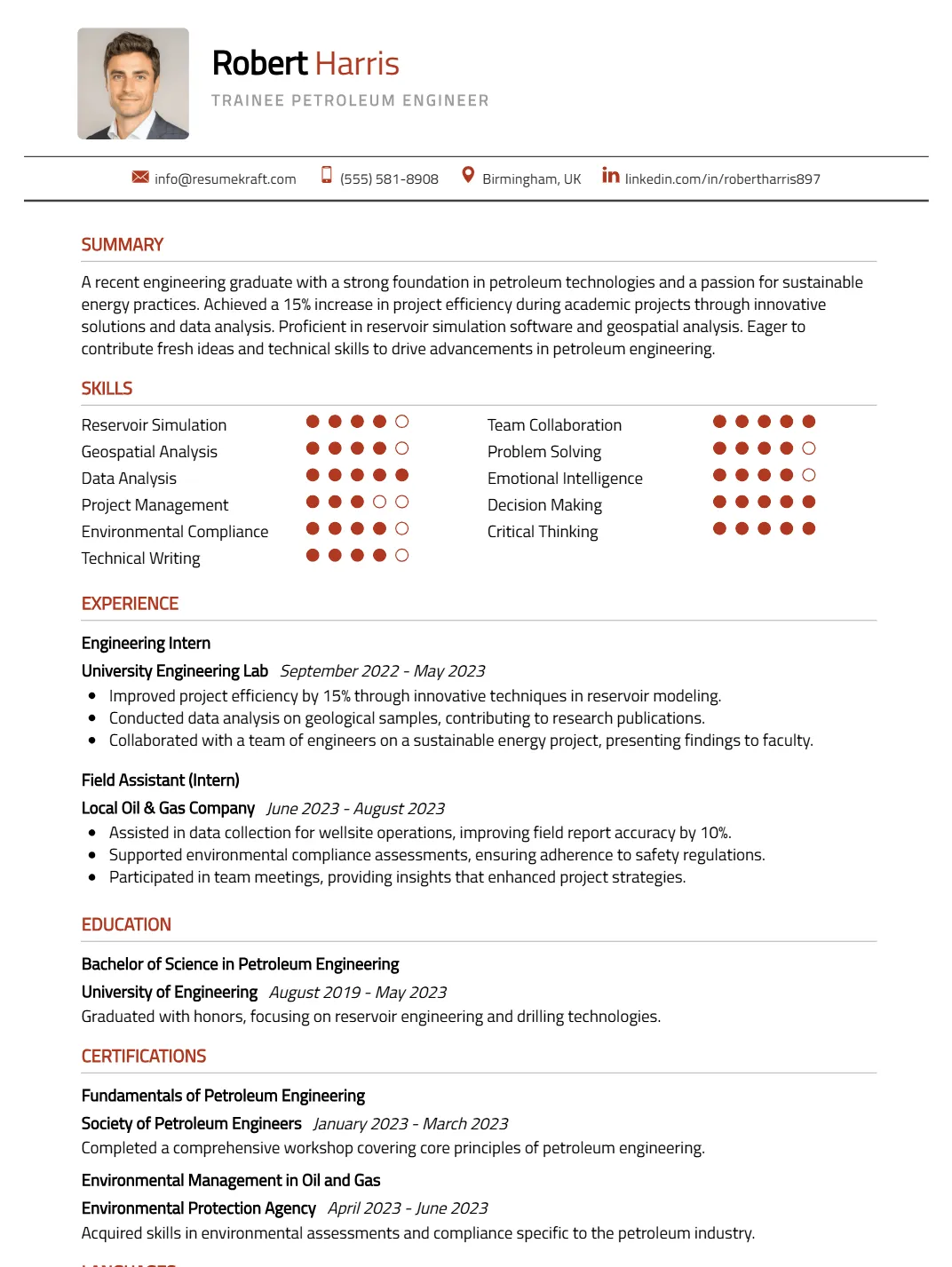
As a fresher Petroleum Engineer, you play a vital role in the exploration and production of oil and gas, contributing to the energy sector’s sustainability and efficiency. Entry-level professionals in this field often engage in tasks such as data analysis, reservoir evaluation, and assisting in drilling operations, which are crucial for optimizing resources. This career path not only offers promising opportunities for growth but also presents challenges, including competition and the need for specialized skills. This article aims to guide new graduates in crafting compelling resumes that highlight their academic achievements, internships, and transferable skills, helping them stand out in a competitive job market.
- Fresher Petroleum Engineer resume examples
- Fresher Petroleum Engineer resume format
- Fresher Petroleum Engineer resume with no experience
- How to list your hard skills and soft skills on your fresher resume
- How to list your education and certifications on your fresher resume
- How to write your fresher Petroleum Engineer resume summary or objective
- Additional sections for a fresher Petroleum Engineer resume
- Key takeaways for writing a professional fresher Petroleum Engineer resume
- Frequently Asked Questions for Fresher Petroleum Engineer Resumes
- How long should my fresher Petroleum Engineer resume be?
- What is the best format for a fresher Petroleum Engineer resume?
- How can I make my fresher Petroleum Engineer resume stand out without work experience?
- What should I include in my fresher Petroleum Engineer resume if I have no relevant experience?
Fresher Petroleum Engineer resume examples
Resume examples for fresh Petroleum Engineers are essential for new graduates and entry-level job seekers as they illustrate how to effectively showcase skills and academic achievements, even with limited work experience. These examples provide valuable insights into what recruiters prioritize in fresh talent, such as relevant projects, internships, and transferable skills. By following these models, beginners can create compelling resumes that highlight their potential and readiness for the industry.
Fresher Petroleum Engineer Resume
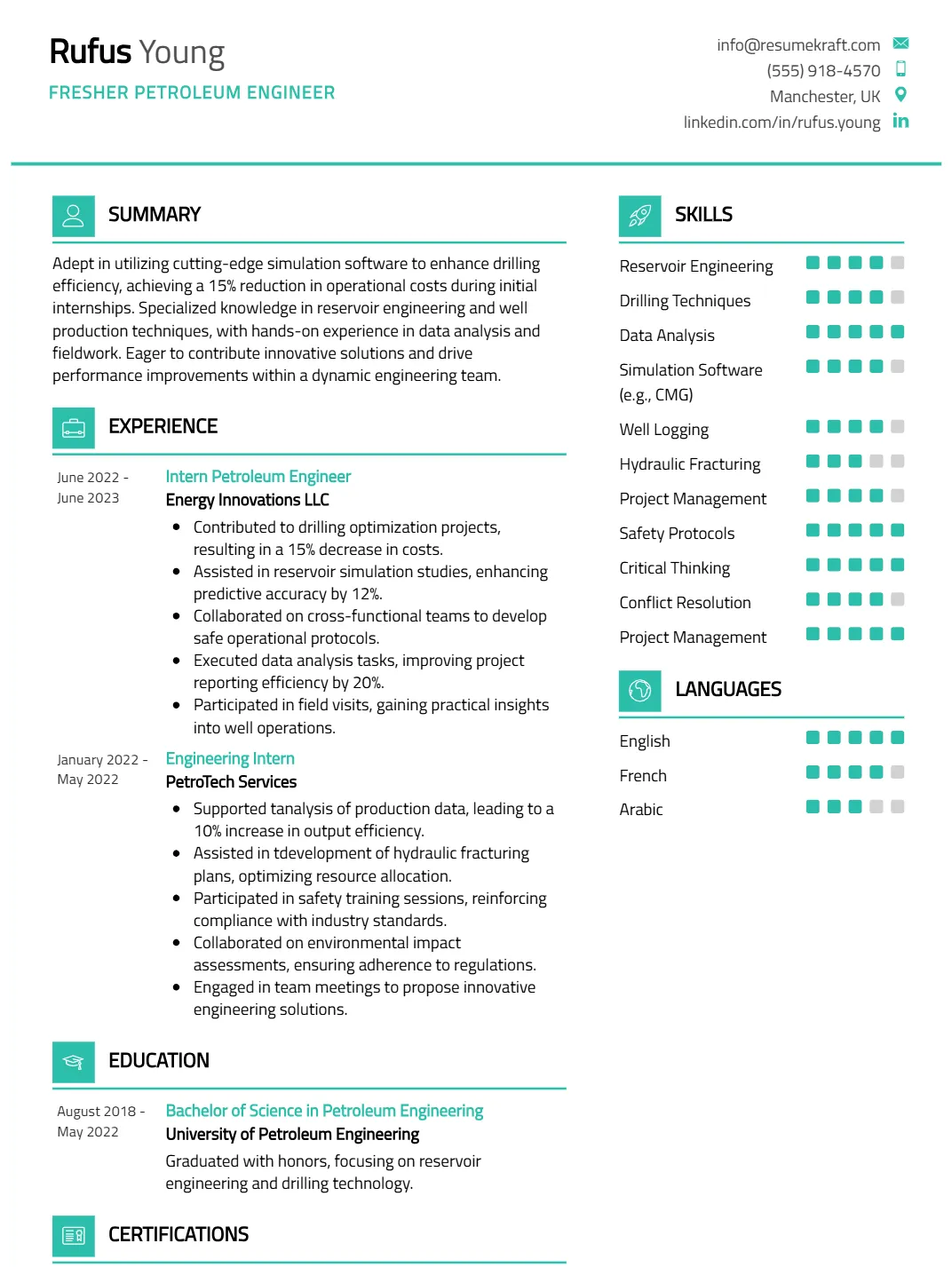
Why This Resume Works
This resume effectively highlights the candidate’s relevant skills, such as Reservoir Engineering and Simulation Software, directly aligning with the requirements of a Fresher Petroleum Engineer position. The structure is clear and concise, making it easy for hiring managers to identify key qualifications quickly. By focusing on applicable internships, the resume demonstrates practical experience in the field. Additionally, its use of industry-specific keywords enhances ATS compatibility, ensuring visibility in automated screenings while showcasing achievements that resonate within petroleum engineering contexts.
Entry-Level Petroleum Engineer Resume
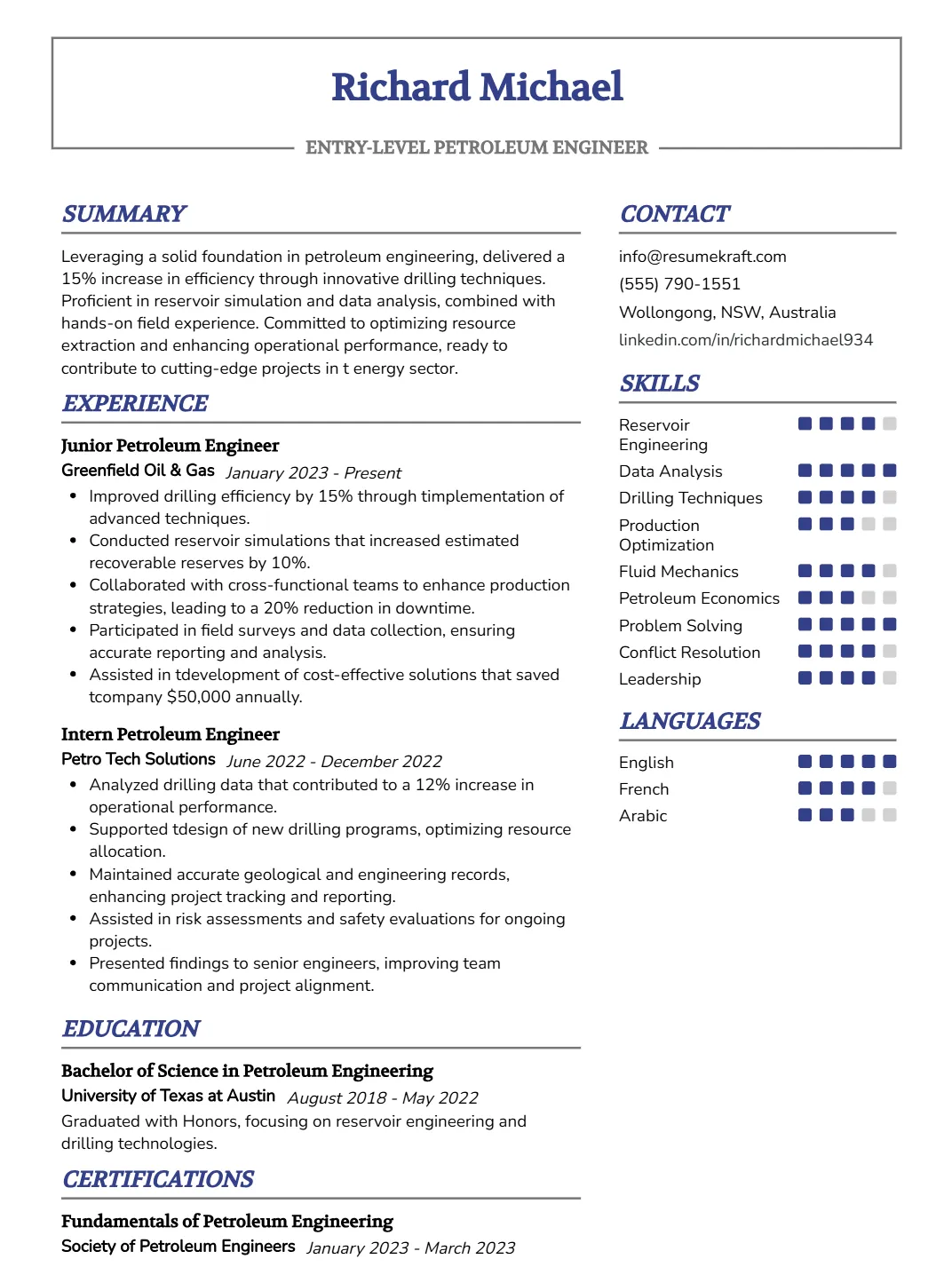
Why This Resume Works
This resume effectively positions the candidate for an Entry-Level Petroleum Engineer role by showcasing relevant skills such as Reservoir Engineering and Production Optimization, which directly align with job requirements. The structured format highlights two years of experience as a Junior and Intern Petroleum Engineer, ensuring clarity for hiring managers. Additionally, it incorporates industry-specific keywords for ATS compatibility, enhancing visibility in applicant tracking systems. Strategic presentation of achievements, like successful data analysis projects, further emphasizes the candidate’s readiness to contribute to the field immediately.
Junior Petroleum Engineer Resume
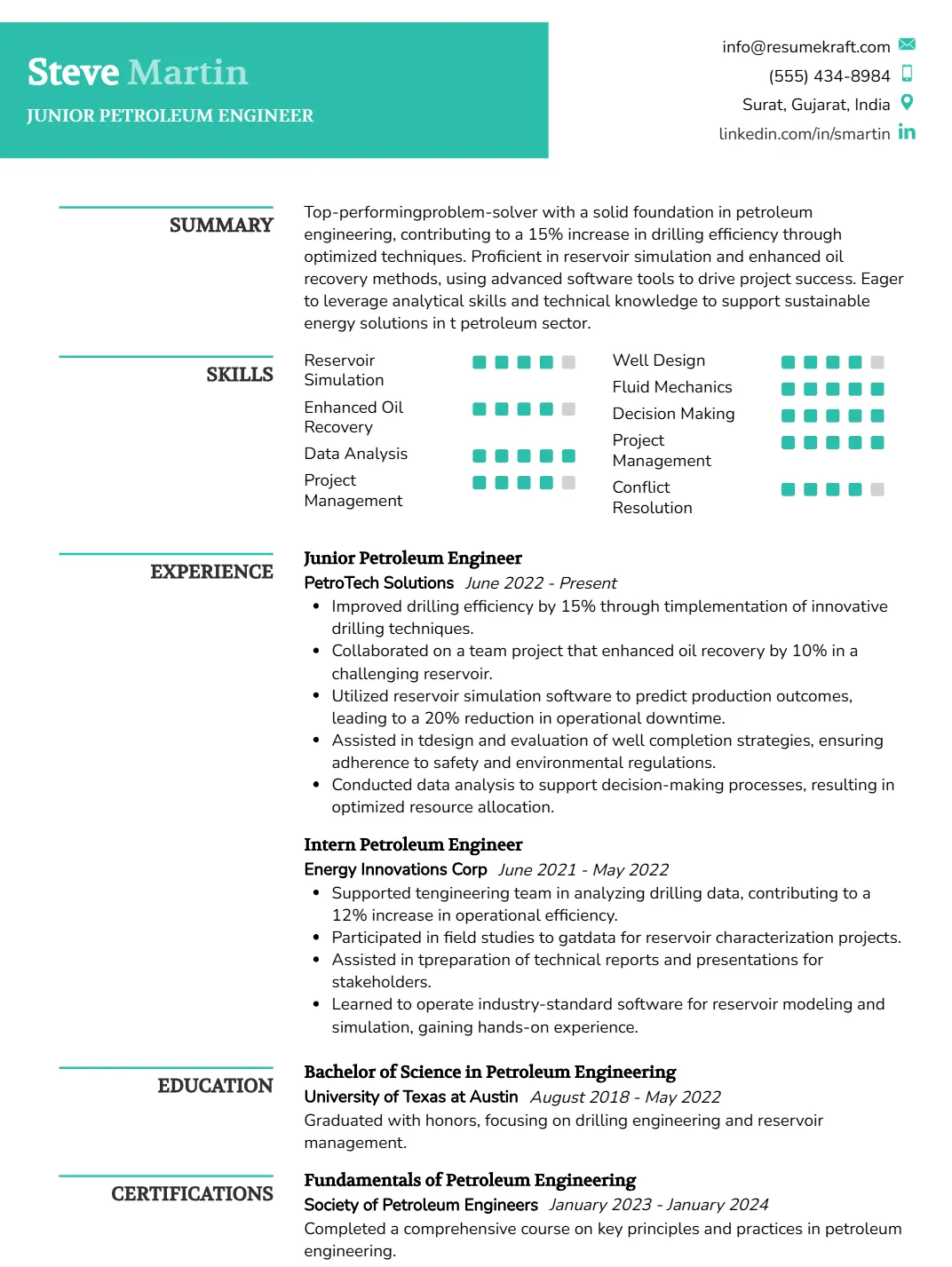
Why This Resume Works
This resume effectively targets the Junior Petroleum Engineer position by showcasing relevant skills such as Reservoir Simulation and Enhanced Oil Recovery, which are critical in the industry. With approximately four years of hands-on experience, it demonstrates a solid foundation in practical applications. The clear format enhances readability, making it ATS-compatible while highlighting key achievements in data analysis and project management. This strategic presentation emphasizes competencies that directly align with job requirements, ensuring the candidate stands out to hiring managers in this competitive field.
Beginner Petroleum Engineer Resume
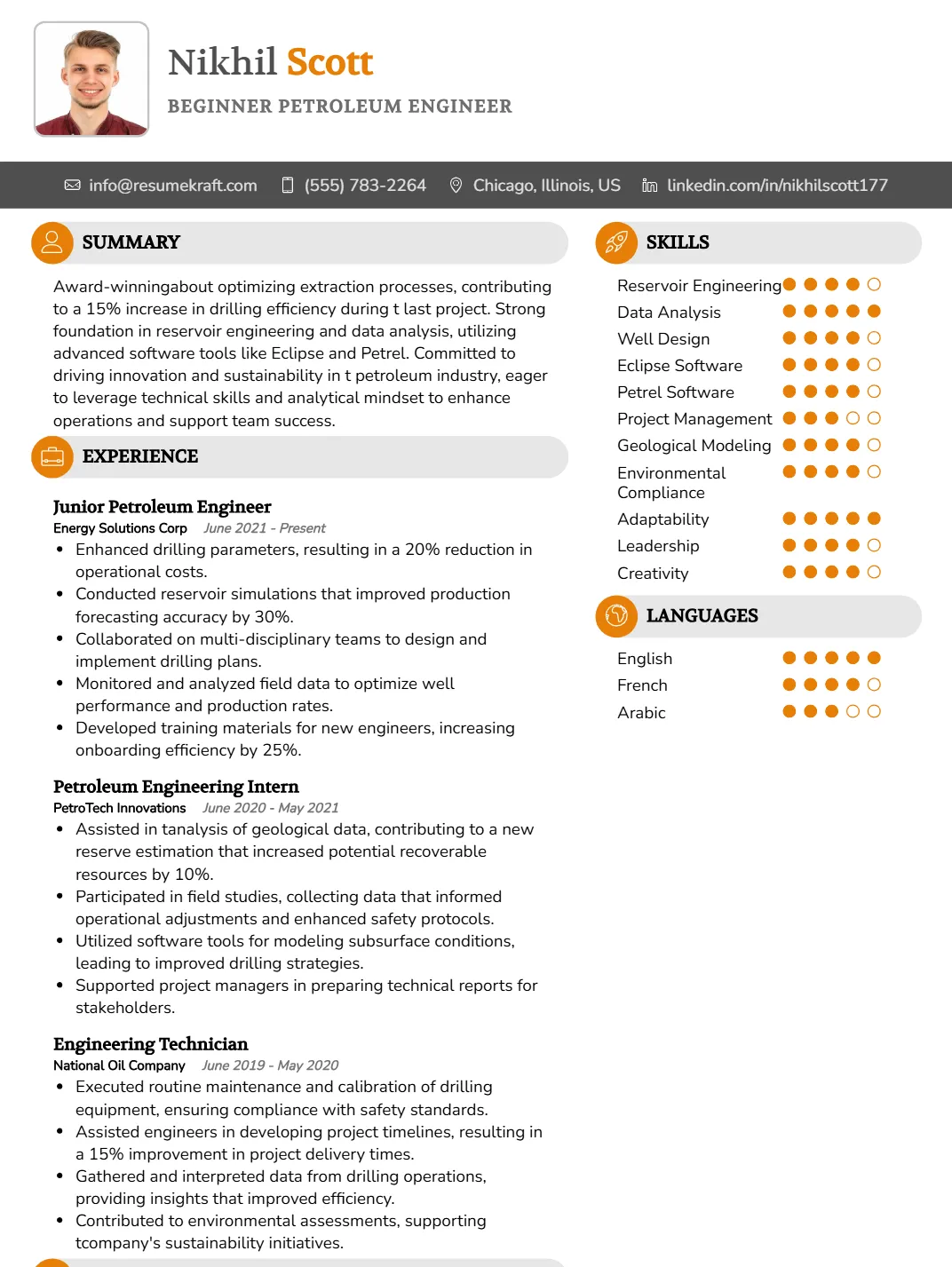
Why This Resume Works
This resume effectively positions the candidate for a Beginner Petroleum Engineer role by highlighting relevant skills such as Reservoir Engineering and software proficiency in Eclipse and Petrel, essential for modern petroleum projects. With approximately six years of experience in roles like Junior Petroleum Engineer and intern positions, it demonstrates a solid foundation in the field. The structured format enhances readability, ensuring ATS compatibility while strategically showcasing achievements that align with industry expectations, making the candidate stand out to potential employers.
Student Petroleum Engineer Resume
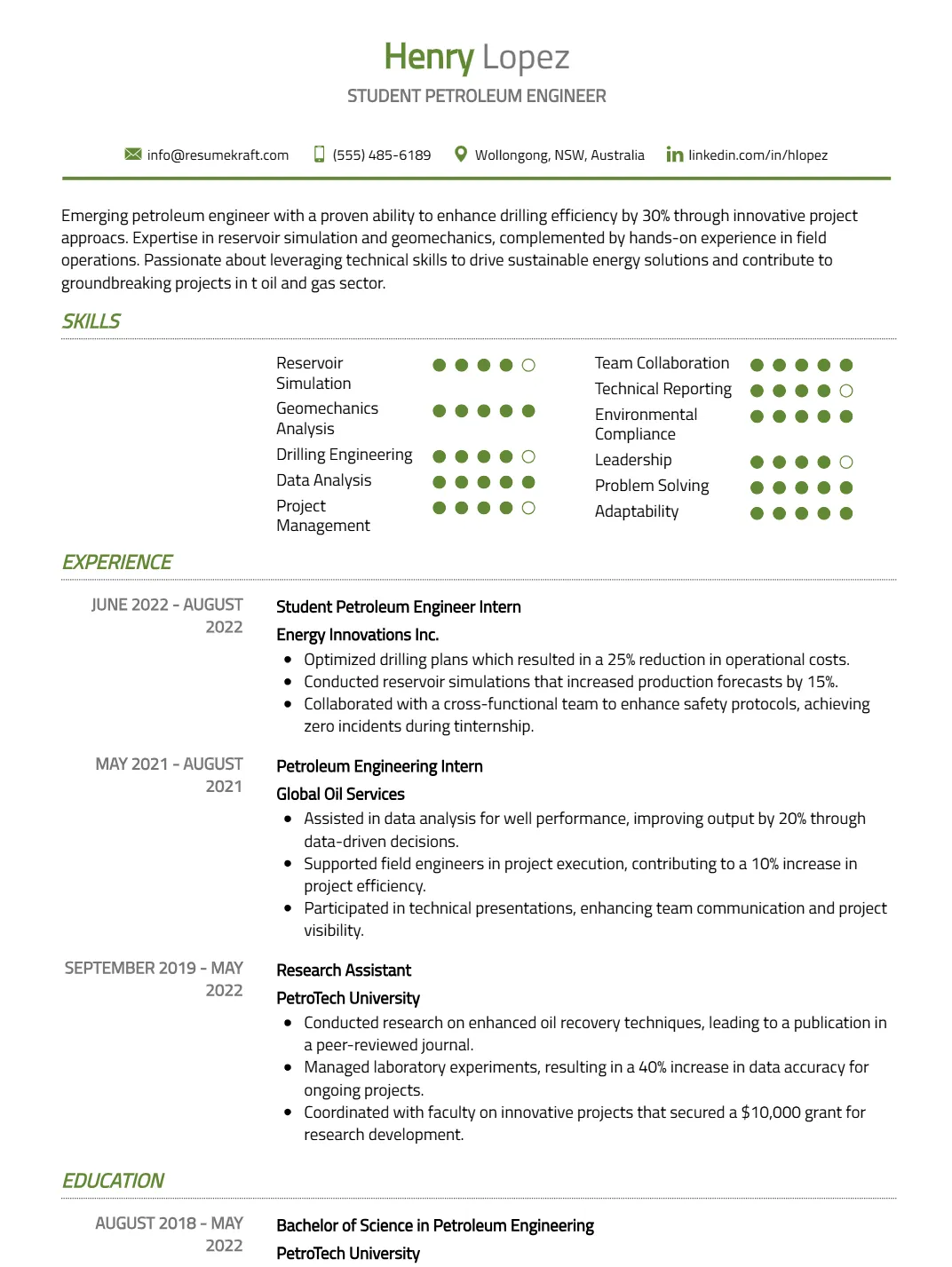
Why This Resume Works
This resume effectively showcases a Student Petroleum Engineer’s qualifications through targeted skills in reservoir simulation, geomechanics analysis, and drilling engineering, directly aligning with industry needs. The structured format highlights relevant internships and research experience over three years, emphasizing practical application of knowledge. Its clear organization enhances ATS compatibility by incorporating industry-specific keywords. Additionally, strategic presentation of achievements—such as successful project management and data analysis—demonstrates the candidate’s ability to contribute meaningfully in real-world scenarios within petroleum engineering.
No-Experience Petroleum Engineer Resume
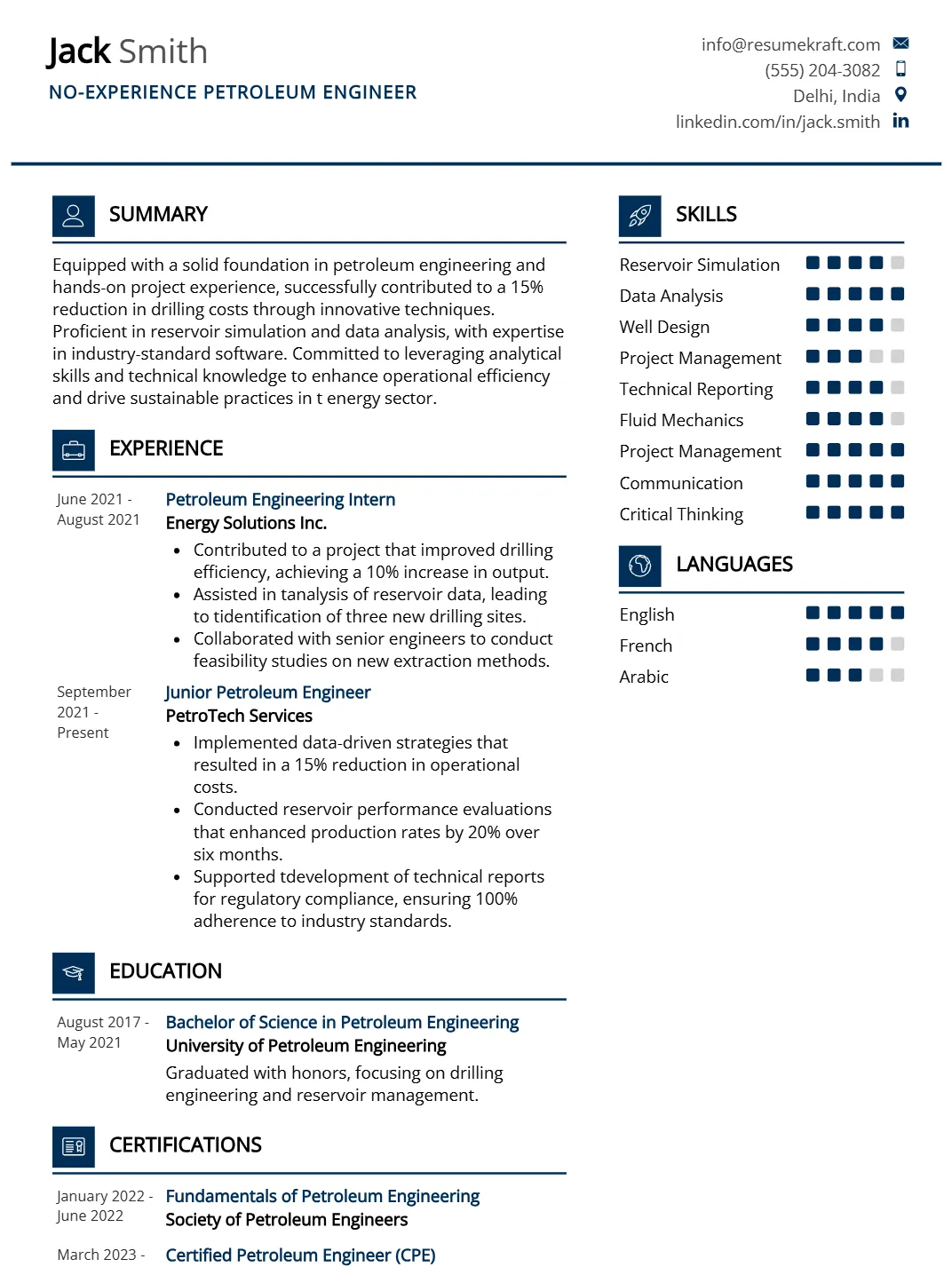
Why This Resume Works
This resume effectively showcases the candidate’s relevant skills, such as reservoir simulation and data analysis, which are crucial for a No-Experience Petroleum Engineer role. The structured format highlights their internship and junior engineer experience, demonstrating practical exposure despite lacking extensive experience. Its clear organization enhances readability for hiring managers and ensures ATS compatibility by incorporating industry-specific keywords. Additionally, strategic presentation of achievements in project management and technical reporting underscores the candidate’s readiness to contribute meaningfully in this field from day one.
Petroleum Engineer Intern Resume
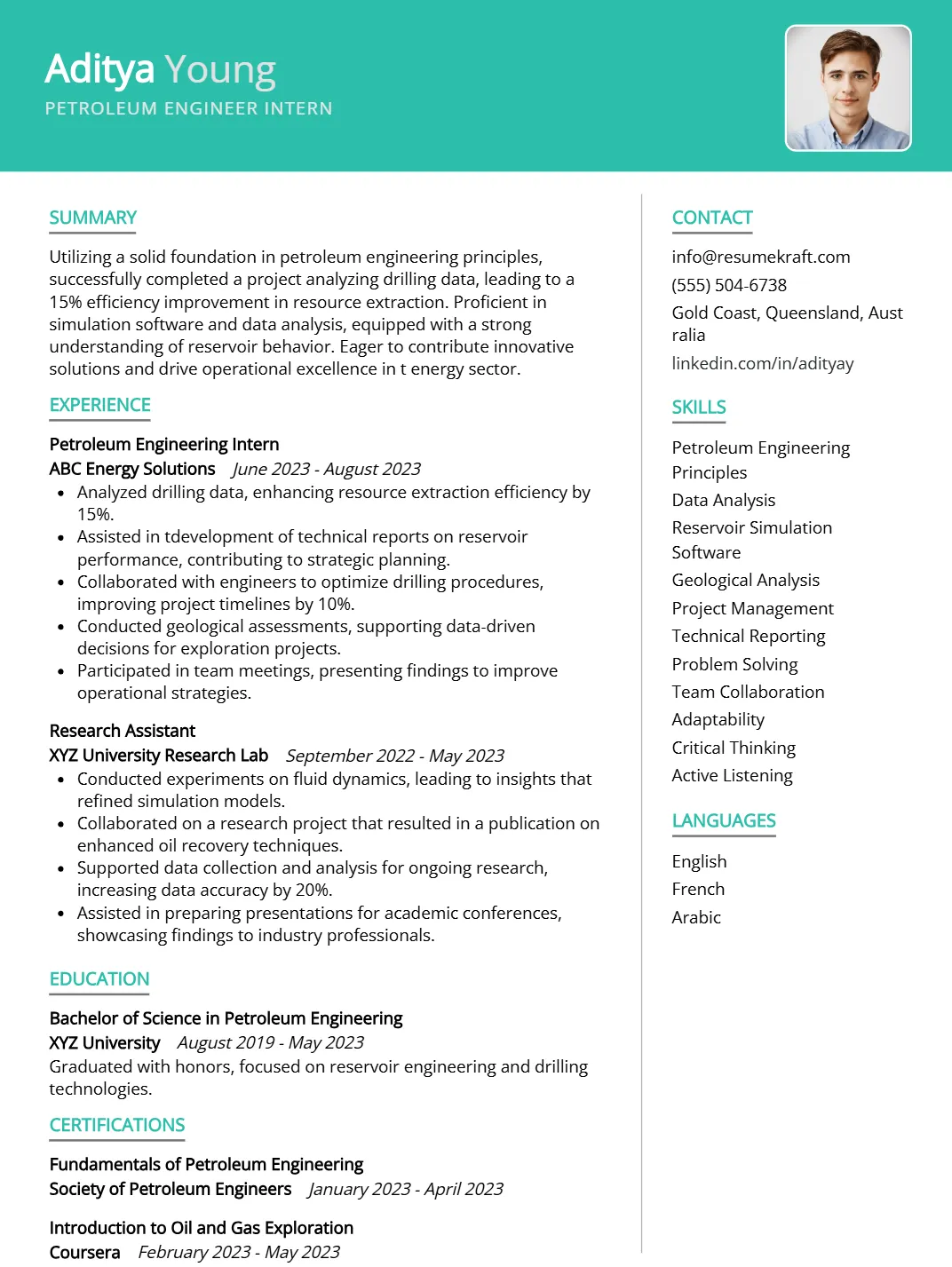
Why This Resume Works
This resume effectively positions the candidate for a Petroleum Engineer Intern role by highlighting key skills such as Petroleum Engineering Principles and Reservoir Simulation Software, directly relevant to the job. The clear, structured format enhances readability, ensuring that hiring managers can quickly identify qualifications. Its alignment with ATS requirements is achieved through the strategic use of industry-specific keywords. Additionally, the candidate’s experience as a Petroleum Engineering Intern and Research Assistant showcases practical achievements, demonstrating their capacity to contribute meaningfully to projects in this field.
Petroleum Engineer Fresher Resume
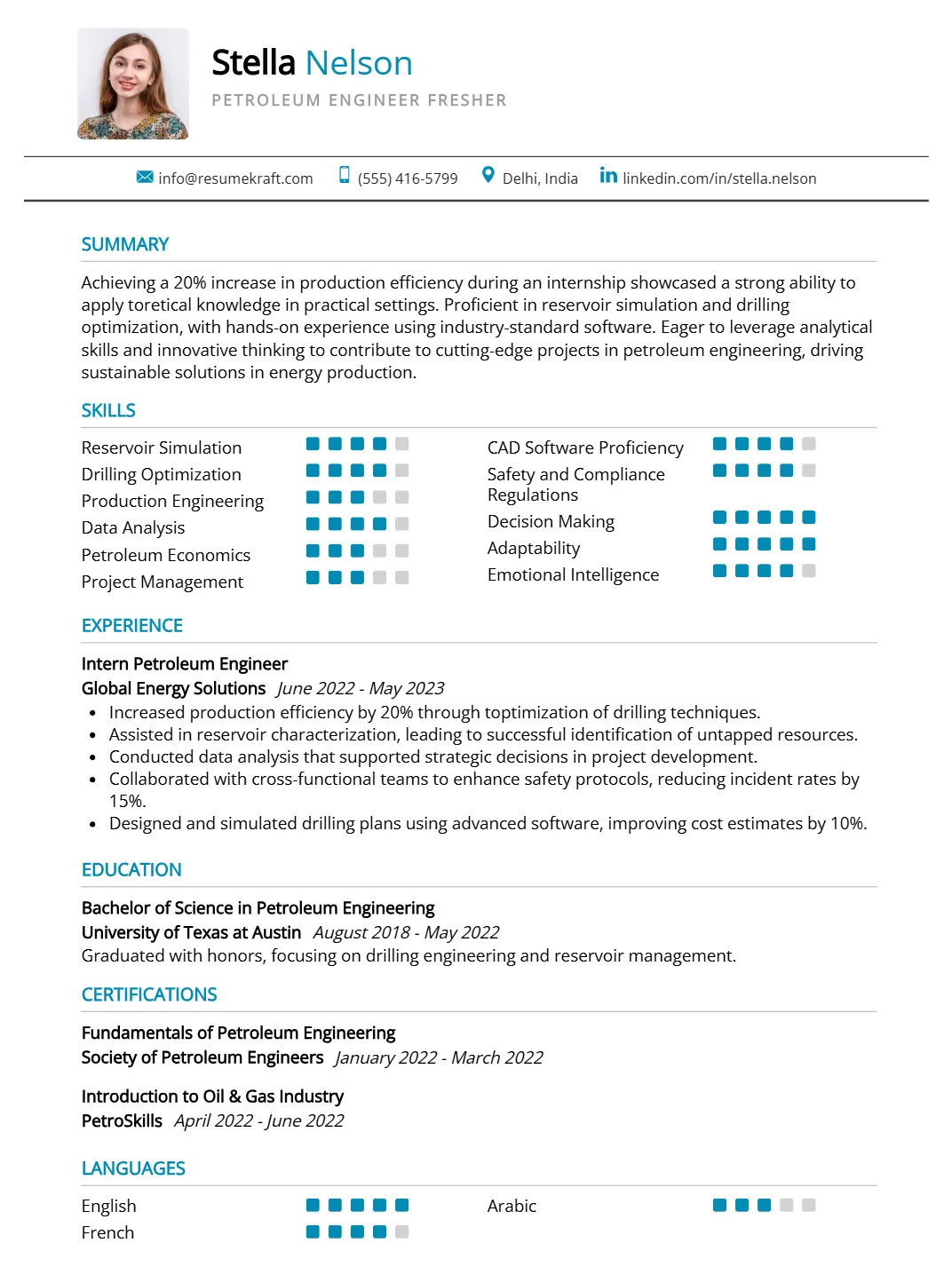
Why This Resume Works
This resume effectively positions the candidate for a Petroleum Engineer Fresher role by highlighting relevant skills such as Reservoir Simulation and Drilling Optimization, which are crucial for the industry. The structured format enhances readability, ensuring key information is easily accessible to hiring managers. It is optimized for Applicant Tracking Systems (ATS) with industry-specific keywords, increasing visibility in digital screenings. Additionally, the strategic presentation of internship experience emphasizes practical application of skills, showcasing achievements that resonate with potential employers in petroleum engineering.
Trainee Petroleum Engineer Resume

Why This Resume Works
This resume effectively positions the candidate for a Trainee Petroleum Engineer role by highlighting essential skills such as Reservoir Simulation and Geospatial Analysis, directly relevant to petroleum engineering tasks. The structured format ensures clarity and easy navigation, appealing to hiring managers. Additionally, it incorporates industry-specific keywords, enhancing its ATS compatibility. By showcasing one year of hands-on experience as an Engineering Intern and Field Assistant, the resume strategically emphasizes practical achievements that align with the responsibilities expected in this field, making it stand out.
Graduate Petroleum Engineer Resume
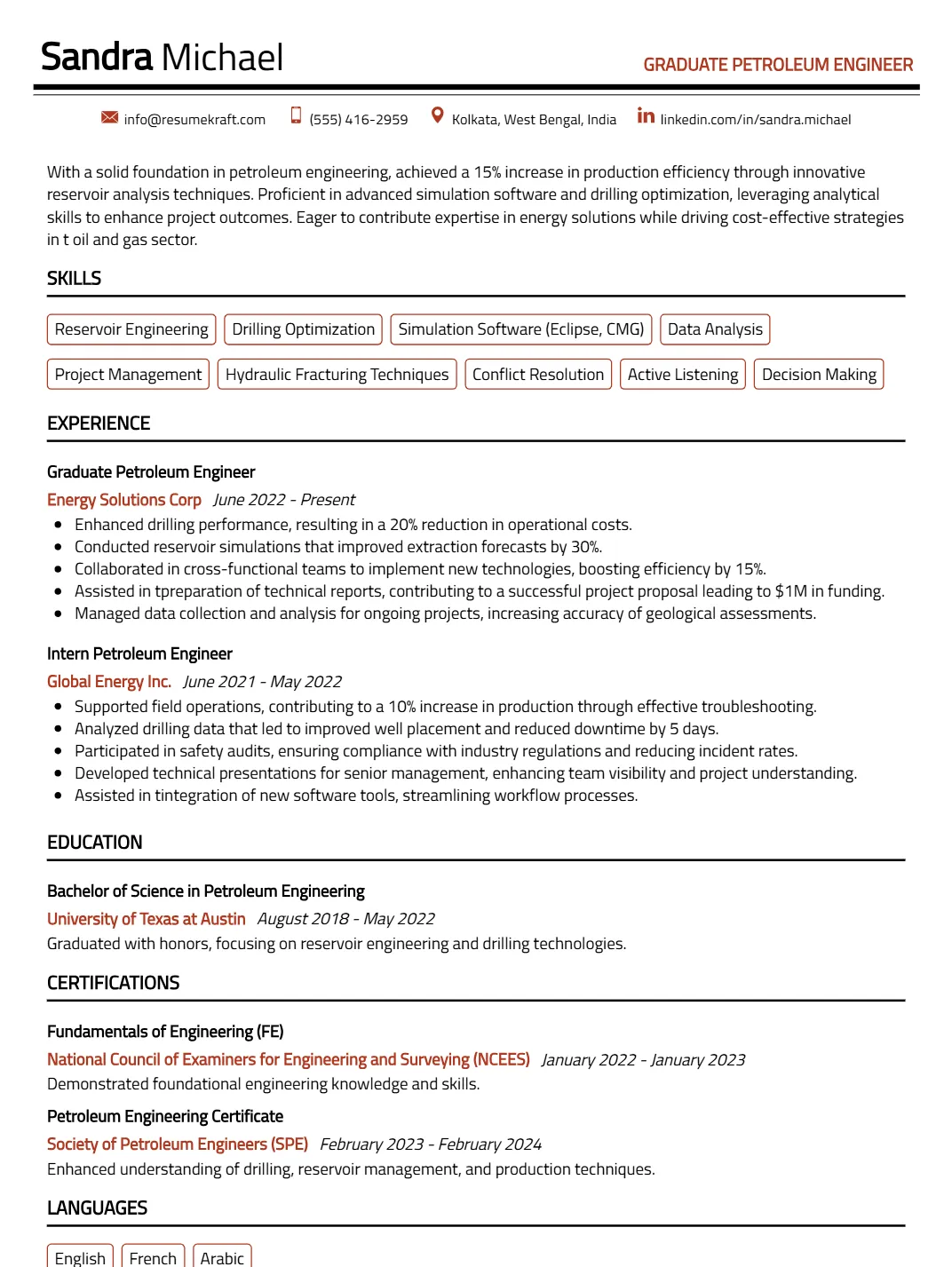
Why This Resume Works
This resume effectively positions the candidate for a Graduate Petroleum Engineer role by showcasing essential skills such as reservoir engineering and drilling optimization, directly relevant to industry demands. The structured format highlights experience as both a Graduate and Intern Petroleum Engineer, underscoring nearly four years of practical exposure. Its ATS-friendly design includes targeted keywords like “simulation software” and “data analysis,” ensuring compatibility with hiring systems. Additionally, strategic presentation of achievements demonstrates the ability to manage projects successfully, appealing to prospective employers in the petroleum sector.
New Graduate Petroleum Engineer Resume
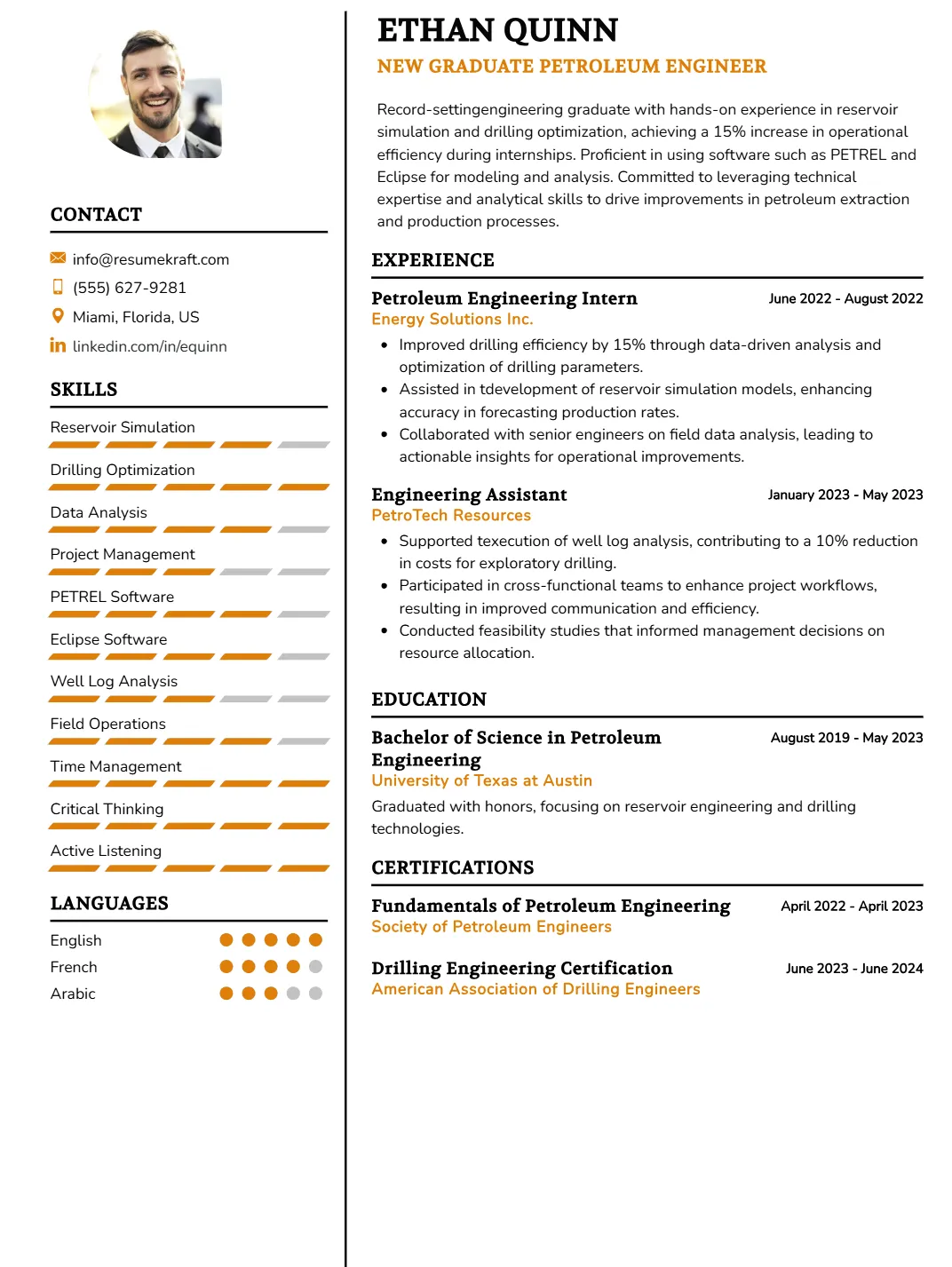
Why This Resume Works
This resume effectively positions the candidate as a strong contender for a New Graduate Petroleum Engineer role by highlighting essential skills such as Reservoir Simulation and Drilling Optimization, directly aligned with industry demands. The structured format ensures clarity, making it easy for hiring managers to find relevant information. It is ATS-compatible through the use of targeted keywords like PETREL Software and Data Analysis. Additionally, the strategic presentation of internship experience showcases practical application of engineering principles, enhancing the candidate’s appeal in this competitive field.
Entry level Petroleum Engineer Resume
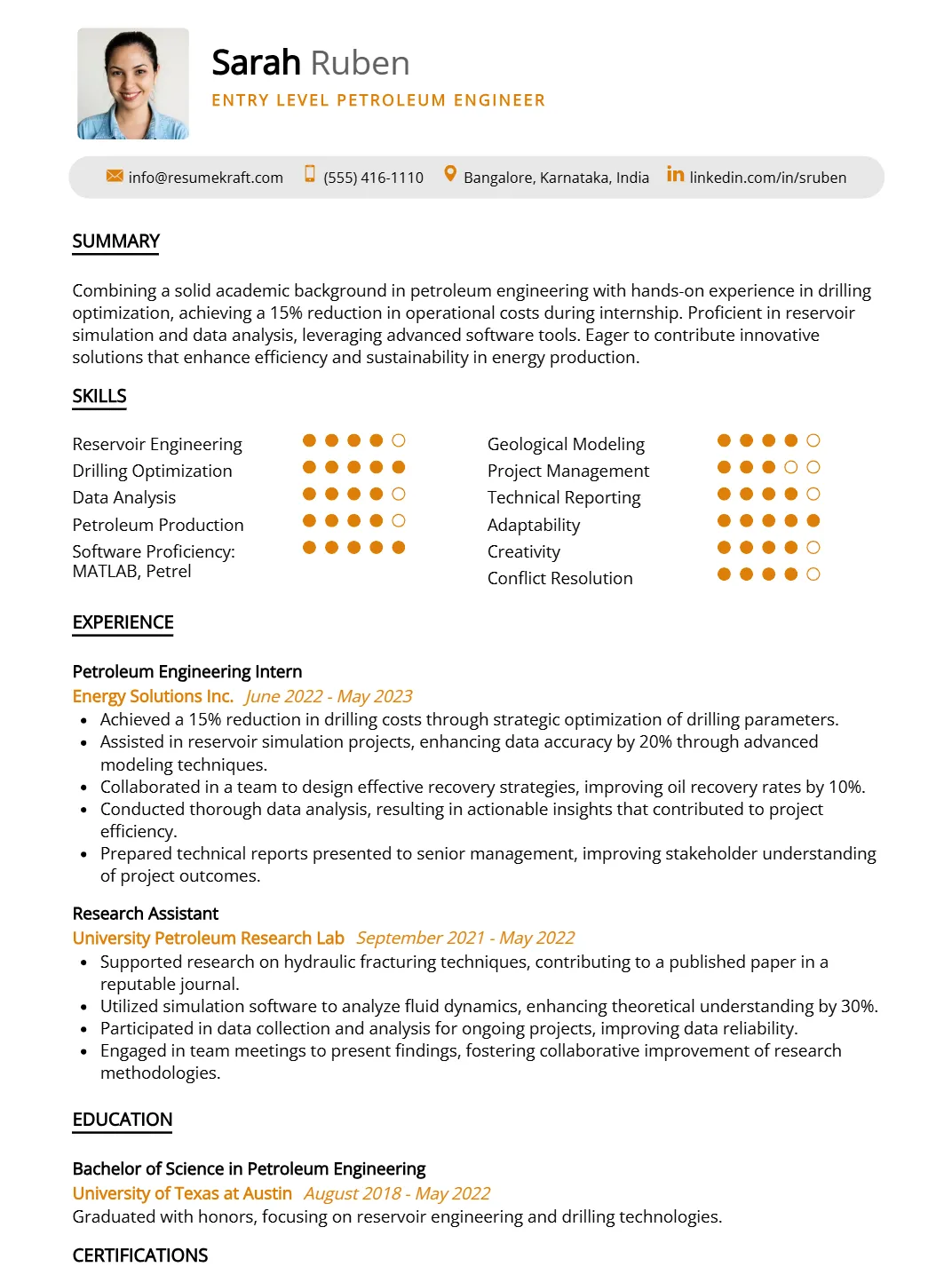
Why This Resume Works
This resume effectively positions the candidate for an Entry Level Petroleum Engineer role by highlighting relevant skills such as Reservoir Engineering and Drilling Optimization. With two years of practical experience as a Petroleum Engineering Intern and Research Assistant, it demonstrates both technical proficiency and applied knowledge. The structured format enhances readability, while key terms improve ATS compatibility, ensuring visibility to recruiters. Additionally, the strategic presentation of achievements directly aligns with industry expectations, showcasing the candidate’s readiness to contribute meaningfully from day one.
Fresher Petroleum Engineer resume format
A well-structured resume format is crucial for fresh Petroleum Engineer graduates to stand out in a competitive job market. Proper formatting not only enhances readability but also showcases professionalism, making a strong first impression on potential employers.
- Use a clean, professional layout with clear headings and bullet points to organize sections like education, projects, and skills, ensuring easy navigation for recruiters reviewing your resume.
- Prioritize your most relevant experiences at the top of each section. For freshers, this means placing academic projects and internships prominently to highlight applicable skills and knowledge.
- Choose a professional font (like Arial or Times New Roman) in a readable size (10-12 points). Consistency in font style and size throughout the resume creates a polished, cohesive appearance.
- Include white space strategically to avoid clutter. Adequate margins and spacing between sections improve readability and allow hiring managers to focus on your accomplishments without feeling overwhelmed.
- Limit your resume to one page, especially as a fresher. This encourages concise writing, ensuring you only include the most relevant experiences and skills that align with the petroleum engineering role you’re targeting.
Fresher Petroleum Engineer resume with no experience
Freshers aspiring to become Petroleum Engineers can craft an impressive resume by highlighting academic projects, relevant coursework, and any volunteer work. It’s essential to showcase skills gained through university lab work, group projects, or simulations that involve problem-solving and analytical thinking. Personal projects, even if hypothetical, can illustrate your passion and understanding of the field, demonstrating that valuable experience comes in various forms.
Even without professional experience, candidates can emphasize transferable skills from other activities, such as leadership in student organizations or technical skills acquired through online courses. By framing these experiences effectively, freshers can present themselves as motivated and capable individuals ready to contribute to the industry.
No work experience in Petroleum Engineering, but I have a degree.
Completed a senior project on reservoir simulation, demonstrating skills in data analysis and modeling, and volunteered at the university’s energy efficiency program, gaining insights into sustainable practices in the petroleum sector.
How to list your hard skills and soft skills on your fresher resume
In the competitive field of petroleum engineering, both hard and soft skills play a crucial role in shaping a fresher’s resume. New graduates can leverage their academic knowledge, online courses, certifications, and personal projects to showcase their technical expertise and interpersonal abilities. Highlighting these skills effectively can help freshers stand out to potential employers, demonstrating their readiness to tackle real-world challenges and contribute meaningfully to a team.
Hard Skills for Fresher Petroleum Engineer:
- Reservoir Engineering: Understanding reservoir behavior and fluid dynamics through coursework.
- Fluid Mechanics: Knowledge of fluid properties and behaviors gained in academic settings.
- Drilling Engineering: Familiarity with drilling techniques and technologies learned in projects.
- Geology: Basic understanding of geological formations and their impact on oil extraction.
- Petroleum Production: Introductory knowledge of production processes from academic training.
- Simulation Software: Experience with software like MATLAB or Aspen HYSYS from academic projects.
- Data Analysis: Skills in analyzing data sets using Excel or Python for coursework projects.
- Safety Regulations: Awareness of industry safety standards gained from certifications or courses.
- Project Management: Basic understanding of managing engineering projects from team assignments.
- Environmental Regulations: Knowledge of environmental impact assessments from coursework.
- GIS Software: Familiarity with Geographic Information Systems for mapping and analysis.
- Well Logging: Understanding of well logging techniques learned through academic labs.
- Thermodynamics: Knowledge of thermodynamic principles essential for petroleum processes.
- Reservoir Simulation: Basic skills in simulating reservoir behavior through academic projects.
- Technical Writing: Ability to write reports and documentation from coursework experience.
Soft Skills for Entry-Level Petroleum Engineer:
- Communication: Ability to convey technical information clearly to diverse audiences.
- Teamwork: Experience working collaboratively in group projects during studies.
- Problem-Solving: Demonstrated ability to approach and solve complex engineering challenges.
- Adaptability: Willingness to learn and adjust to new tools and technologies in the field.
- Critical Thinking: Skills in evaluating information and making informed decisions.
- Time Management: Ability to prioritize tasks and meet deadlines during academic assignments.
- Attention to Detail: Precision in analyzing data and producing engineering reports.
- Creativity: Innovative thinking showcased in academic projects and problem-solving scenarios.
- Leadership: Experience leading team projects, even in academic settings.
- Networking: Ability to build relationships through university events and industry meet-ups.
- Work Ethic: Demonstrated commitment to completing projects and achieving academic goals.
- Interpersonal Skills: Ability to collaborate effectively with peers and faculty members.
- Negotiation: Skills developed through group projects requiring consensus-building.
- Initiative: Proactive approach to seeking additional learning opportunities and certifications.
- Resilience: Capability to handle setbacks and still pursue goals diligently.
How to list your education and certifications on your fresher resume
To make their educational background stand out, freshers in Petroleum Engineering should focus on key coursework, certifications, and academic projects that align with industry requirements. Highlighting relevant subjects such as Fluid Mechanics, Thermodynamics, and Reservoir Engineering, along with any hands-on projects like drilling simulations or design competitions, can effectively showcase practical knowledge and skills. Additionally, mentioning any honors or awards received can further enhance their profile.
When listing education, it’s crucial to detail any relevant certifications, such as safety training or software proficiency, to demonstrate readiness for the field. Freshers should aim to connect their academic experiences to real-world applications, showing potential employers their commitment and enthusiasm for the industry.
Bachelor’s degree in Petroleum Engineering. Took some courses and did a few projects.
Bachelor of Science in Petroleum Engineering, XYZ University. Relevant coursework: Reservoir Engineering, Drilling Technology, and Fluid Mechanics. Led a team project on optimizing drilling operations, resulting in a simulated 15% cost reduction.
How to write your fresher Petroleum Engineer resume summary or objective
A strong resume summary or objective is crucial for freshers applying for a Petroleum Engineer position, as it serves as the first impression to potential employers. This opening statement should highlight the candidate’s enthusiasm for the field, relevant skills acquired through education or projects, and their eagerness to contribute to the company. Freshers should use a summary when they have a few experiences to showcase, while an objective is more suitable for those starting their careers with little to no experience, focusing on their aspirations and potential.
Recent graduate looking for a job in the oil and gas industry. I want to work as a Petroleum Engineer.
Enthusiastic recent Petroleum Engineering graduate with a strong foundation in reservoir analysis and drilling techniques, eager to apply my academic knowledge and problem-solving skills in a dynamic engineering team. Committed to contributing to innovative energy solutions.
Additional sections for a fresher Petroleum Engineer resume
For fresher Petroleum Engineer candidates, additional resume sections can effectively highlight potential, learning ability, and relevant skills, helping to mitigate the challenge of limited professional experience. These sections can showcase academic achievements, projects, and extracurricular activities that demonstrate readiness for the industry.
- Academic Projects: Include significant projects from your coursework that relate to petroleum engineering. Detail your role, the technologies used, and the outcomes to illustrate your technical skills and problem-solving abilities.
- Relevant Coursework: List specialized courses that have equipped you with essential knowledge in areas like reservoir engineering or drilling operations. This highlights your academic foundation and commitment to the field.
- Volunteer Work: Highlight any volunteer experiences related to engineering or community service. This can demonstrate your teamwork, leadership skills, and commitment to making a difference, which are valuable traits in any engineering role.
- Certifications: Include relevant certifications such as safety training or software proficiency in engineering tools. This shows your initiative to learn and adapt, making you a more attractive candidate to potential employers.
- Extracurricular Activities: Mention participation in engineering clubs or competitions. This reflects your passion for the field, ability to collaborate with peers, and willingness to engage in hands-on experiences outside the classroom.
Key takeaways for writing a professional fresher Petroleum Engineer resume
- Highlight relevant coursework and projects, such as reservoir simulation or drilling engineering, to showcase your knowledge and passion for petroleum engineering.
- Include internships or co-op experiences, emphasizing specific contributions and skills gained, even if they were short-term or part-time.
- Utilize resume templates designed for engineering roles to ensure your layout is professional and makes a strong first impression.
- Showcase transferable skills such as teamwork, problem-solving, and analytical abilities, which are crucial in the petroleum industry.
- Consider using an ai resume builder to create a tailored resume that highlights your strengths and aligns with job descriptions in the petroleum sector.
Frequently Asked Questions for Fresher Petroleum Engineer Resumes
How long should my fresher Petroleum Engineer resume be?
Your resume should ideally be one page long, especially as a fresher. This length allows you to present your educational background, skills, and projects clearly and concisely. Ensure you focus on relevant information such as your degree, internships, academic projects, and skills that relate directly to petroleum engineering. Keeping it concise will help hiring managers quickly see your qualifications without wading through unnecessary detail.
What is the best format for a fresher Petroleum Engineer resume?
The best format for your resume is the reverse-chronological format, which highlights your most recent education and relevant projects first. Start with your contact information, followed by an objective statement that reflects your career goals in petroleum engineering. Then, list your education, projects, and skills relevant to the field. This format makes it easy for hiring managers to identify your qualifications and strengths, even if your work experience is limited.
How can I make my fresher Petroleum Engineer resume stand out without work experience?
To make your resume stand out, focus on showcasing academic projects, relevant coursework, and technical skills. Highlight any hands-on experience during your studies, such as labs or simulations related to petroleum engineering. Additionally, include any internships, volunteer work, or extracurricular activities that demonstrate your passion for the field. Use action verbs and quantifiable results to describe your contributions, making your resume more engaging and impactful.
What should I include in my fresher Petroleum Engineer resume if I have no relevant experience?
If you lack relevant experience, emphasize your educational achievements, including your degree, relevant coursework, and any specialized training. Include academic projects that demonstrate your understanding of petroleum engineering concepts, such as reservoir simulation or drilling technology. Additionally, list technical skills like software proficiency (e.g., AutoCAD, MATLAB) and any certifications related to the industry. Highlighting transferable skills, such as teamwork and problem-solving, can also enhance your resume.

